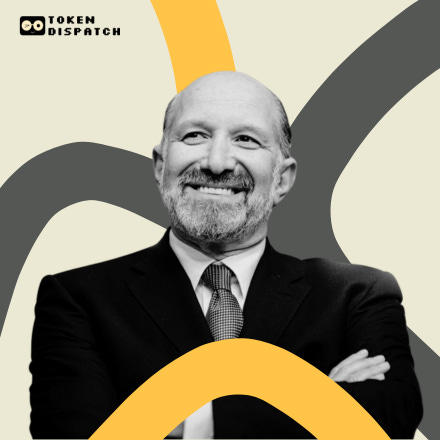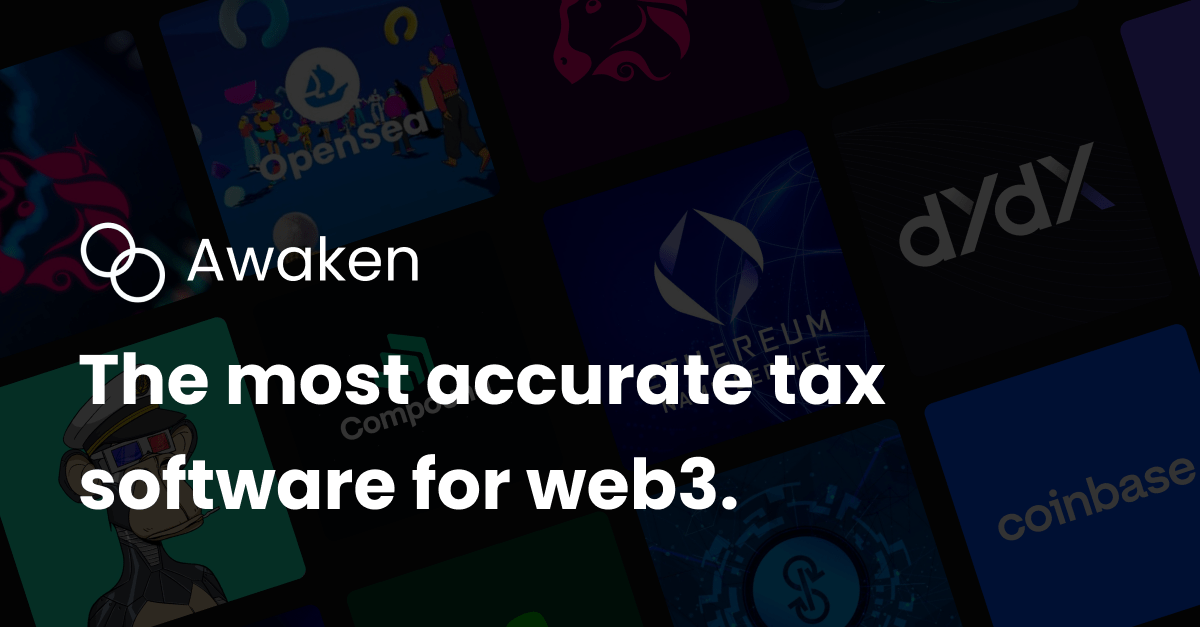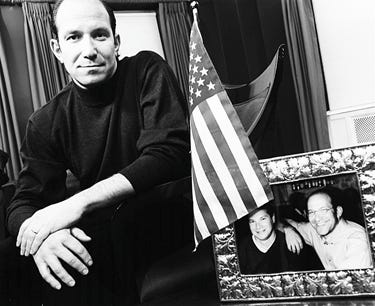TGIF Dispatchers.
There's something fitting about the fact that Howard Lutnick — Wall Street veteran, catastrophe survivor, and now America's Commerce Secretary — has become one of the prominent figures shaping the nation's first Bitcoin strategic reserve.
The March 7 White House Crypto Summit will cement his transformation from traditional finance powerhouse to cryptocurrency kingmaker.
How did we get here? How did a man who lost 658 colleagues, including his brother, in the 9/11 attacks become the driving force behind America's most ambitious crypto policy experiment?
The answer lies in a remarkable journey of reinvention that spans decades of personal tragedy, financial innovation, and political manoeuvering.
Do Your Crypto Taxes for FREE with Awaken
Effortless Tax Filing for Crypto Holders
2024 was a big year for crypto traders. Now, tax season is here—but it doesn’t have to be complicated. Awaken simplifies the process, helping you file in minutes.
Secure and private—your data stays encrypted
Supports Bitcoin, Solana, Ethereum, Base, Hyperliquid, and Sui
Works with DeFi, NFTs, staking, LPing, and trading
How It Works
Connect your wallets & exchanges (Coinbase, Kraken, Gemini, and more)
Auto-import & label every transaction—no manual work needed
Download a ready-to-file tax report for multiple countries
Get your crypto taxes sorted—fast, accurate, and free.
Early Years
Howard Lutnick's story begins in Jericho, New York, where he was born on July 14, 1961, to an intellectually sound family. His father, Solomon, was a history professor at Queens College, and his mother, Jane - a painter and sculptor.
His mother died during his senior year of high school. Then came an even crueler blow — his father died from a chemotherapy dosing error while Lutnick was just beginning college. At 18, he stood alone.
Haverford College offered him a full scholarship rather than let him drop out. Lutnick seized this chance, graduating in 1983 with an economics degree.
Decades later, he repaid this kindness with over $65 million in donations to Haverford. The once-orphaned student became one of the college's greatest benefactors.
Fresh from college, Lutnick joined Cantor Fitzgerald as a junior trader in 1983. The firm's innovation in Treasury securities trading provided perfect soil for his ambition.
His rise was meteoric. By 1991, just eight years in, Lutnick became President and CEO at age 30. By 1996, he added Chairman to his title.
Under his leadership, Cantor evolved from bond brokerage to global financial powerhouse. He pushed into electronic trading through eSpeed, foreseeing finance's digital future years before competitors.
Then came September 11, 2001.
When American Airlines Flight 11 hit the North Tower, Cantor's offices took a direct impact. The firm lost 658 of 960 New York employees — two-thirds of its workforce. Among them was Lutnick's brother, Gary.
Lutnick himself had been taking his son to his first day of kindergarten. This twist of fate left him with an impossible burden: rebuilding a decimated company while supporting hundreds of grieving families.
His response defied Wall Street norms. He pledged 25% of Cantor's profits over five years to victims' families. He continued their health insurance for a decade. Ultimately, the firm distributed $180 million to those who lost loved ones.
Cantor was trading again by September 13. Working from temporary spaces and homes, the surviving team fought to keep the firm alive — not just for themselves, but for the families depending on its success.
The Cantor Fitzgerald Relief Fund, initially for 9/11 families, now helps victims of disasters worldwide.
"We had a company to rebuild, but we also had families to take care of," Lutnick recalled in subsequent interviews, his voice often breaking with emotion.
Get 17% discount on our annual plans and access our weekly premium features (HashedIn, Wormhole, Rabbit hole and Mempool) and subscribers only posts.
The Crypto Awakening
Lutnick's entry into crypto wasn't a dramatic pivot but rather a gradual recognition of its potential. The turning point came in 2021 when Cantor Fitzgerald began managing Tether's US Treasury portfolio.
Tether (USDT), the world's largest stablecoin with a market cap of approximately $142 billion today, has long faced scepticism about its reserves. By attaching Cantor's name and reputation to Tether, Lutnick helped legitimise a cornerstone of the crypto ecosystem.
This relationship was tested in 2022 when Sam Bankman-Fried attempted what Lutnick described as a "liquidity trap" by redeeming $10 billion in Tether at once. Cantor was able to meet this demand instantly, cementing both Tether's legitimacy and Cantor's role in the crypto ecosystem.
"From what I've seen — and we did a lot of work — they have the money they say they have," Lutnick told Bloomberg.
Lutnick has even gone ahead and publicly expressed confidence in Tether’s financial health.
This experience seems to have converted Lutnick into a true believer. Over the next two years, Cantor Fitzgerald systematically built one of Wall Street's most aggressive crypto portfolios.
3,580,131 shares of Strategy Inc. (formerly MicroStrategy), valued at $1.036 billion
A 221% increase in iShares Bitcoin Trust ETF holdings to 1,127,368 shares ($86.8 million)
A 5% stake in Tether valued at approximately $600 million
Significant positions in Coinbase, crypto ETFs, and mining companies
Beyond these investments, Lutnick announced plans in mid-2024 for a $2 billion Bitcoin financing and lending business.
His public statements evolved from cautious endorsements to full-throated advocacy. "Bitcoin is like gold and should be free trade everywhere in the world," he proclaimed.
The Trump Connection
Lutnick's relationship with Donald Trump began long before either man was associated with cryptocurrency. As Trump's political ambitions grew, so did Lutnick's support. He was a significant fundraiser for Trump's presidential campaigns in both 2020 and 2024.
His nomination as Commerce Secretary in November 2024 came as a pleasant surprise to crypto advocates. Though Elon Musk and others had pushed for Lutnick to lead the Treasury Department, the Commerce position gave him a perfect platform to influence crypto policy.
Lutnick's confirmation hearings in January and February 2025 focused heavily on his cryptocurrency investments and potential conflicts of interest. Senate Democrats grilled him about Cantor Fitzgerald's ties to Tether, prompting Lutnick to soften some of his previous statements.
He confirmed that Cantor Fitzgerald made a convertible debt investment in Tether's parent company in April 2024, but emphasised it does not equate to an ownership stake in Tether.
While acknowledging the need for audits of US dollar stablecoin issuers, Lutnick refrained from calling for an independent audit of Tether specifically.
He dismissed allegations of improper influence over crypto regulation.
Admitted that Cantor Fitzgerald does not conduct continuous diligence on Tether’s financial statements.
Despite these challenging exchanges, Lutnick was confirmed by a 51-45 Senate vote. Upon confirmation, he stepped down from his leadership roles at Cantor Fitzgerald, with his sons Brandon and Kyle taking over as chairman and vice chairman, respectively.
The Strategic Reserve Vision
In July 2024, Trump attended the Bitcoin 2024 conference and promised to create a "strategic national Bitcoin reserve" if elected. Few took these comments seriously at the time until Trump's victory in November, followed by Lutnick's nomination, suddenly made the prospect very real.
Read: Can Bitcoin Reserve Be the Magic Pill? 🏛️
The plot thickened considerably last weekend when Trump posted that the reserve would include not just Bitcoin but also XRP, SOL, and ADA.
This announcement triggered immediate backlash from Bitcoin maximalists, who view bitcoin as fundamentally different from other cryptocurrencies.
Read: XRP, SOL, and ADA: What’s Beyond Trump’s Reserve? 🔄
In a recent interview Lutnick provided crucial clarity.
"The President definitely thinks that there's a Bitcoin strategic reserve. Now there will be the question of, how do we handle the other cryptocurrencies? And I think the model is going to be announced on Friday."
"So Bitcoin is one thing, and then the other currencies, the other crypto tokens, I think, will be treated differently — positively, but differently."
This statement suggests a tiered approach, with Bitcoin receiving special status in line with its position as the first, largest, and most decentralised cryptocurrency.
The market responded enthusiastically, with Bitcoin breaking back above $90,000, climbing around 10% over the last 24 hours.
Today’s White House Crypto Summit represents a watershed moment for cryptocurrency in America. Up to 25 participants have been confirmed, including Strategy founder Michael Saylor, Chainlink co-founder Sergey Nazarov, and Coinbase CEO Brian Armstrong.
The summit will address two primary agenda items: establishing a regulatory roadmap for crypto and confirming details of Trump's proposed crypto strategic reserve.
For Lutnick, it's an opportunity to showcase his vision for integrating cryptocurrency into America's financial strategy.
Criticism and Controversies
Despite Lutnick's popularity in crypto circles, his rapid rise as America's crypto architect has not been without critics.
The most persistent criticism centres on potential conflicts of interest. When Lutnick stepped down from Cantor Fitzgerald, he handed control to his sons, raising questions about whether this represents a genuine divestment.
"Handing the business off to your son feels like a less than satisfactory way to make sure you are disconnected from the way your executive decisions affect that business," noted Bennett Tomlin, head of research at Protos Media.
Senator Elizabeth Warren has been particularly vocal about Lutnick's Tether connections, highlighting the stablecoin's lack of transparency.
Some economists question the entire premise of a national cryptocurrency reserve. Unlike the strategic petroleum reserve, which serves clear national security purposes during supply disruptions, the purpose of stockpiling volatile digital assets remains less defined.
Critics also point to Lutnick's shifting statements during his confirmation hearings. After previously claiming that "Tether has every penny," he later acknowledged that "Cantor Fitzgerald is not conducting continuous diligence on Tether's financial statements."
Even within the crypto community, Lutnick faces skepticism from Bitcoin maximalists who view his openness to altcoins as a fundamental misunderstanding of what makes Bitcoin unique as a monetary asset.
Token Dispatch View 🔍
Howard Lutnick's appointment represents a radical shift in America's financial posture in decades.
For better or worse, we are witnessing the birth of what might one day be called the "Lutnick Doctrine" — the belief that America's financial hegemony can be extended into the digital realm through strategic acquisition of cryptocurrencies and embrace of private sector stablecoins.
It's a staggeringly ambitious bet. If it works, Lutnick will have helped cement America's financial dominance for another generation. If it fails, he risks not only personal reputation but potentially destabilising the very dollar system he claims to protect.
What makes Lutnick uniquely qualified for this high-wire act isn't his crypto knowledge — plenty of people understand blockchain better. It's his intimate familiarity with catastrophe and recovery.
Here is a man who rebuilt a financial firm from the ashes of America's darkest day. He knows that even apparently terminal crises can be survived with sufficient will and vision. That psychological fortitude — more than any technical expertise — may prove the deciding factor in whether America's crypto experiment succeeds.
As for the conflicts of interest? They're real and concerning. What could be more alarming is a Commerce Secretary with no skin in the game, making decisions about an industry they've never participated in.
Beyond merely policies, tomorrow's White House Crypto Summit will be about America betting its financial future on a new paradigm, guided by a man whose life has been defined by resilience in the face of devastation.
That's either the right combination for this moment, or a recipe for a whole new kind of financial calamity. By this time next year, we'll likely know which.
Token Dispatch is a daily crypto newsletter handpicked and crafted with love by human bots. You can find all about us here 🙌
If you want to reach out to 200,000+ subscriber community of the Token Dispatch, you can explore the partnership opportunities with us.
Disclaimer: This newsletter contains sponsored content and affiliate links. All sponsored content is clearly marked. Opinions expressed by sponsors or in sponsored content are their own and do not necessarily reflect the views of this newsletter or its authors. We may receive compensation from featured products/services. Content is for informational purposes only, not financial advice. Trading crypto involves substantial risk - your capital is at risk. Do your own research.











